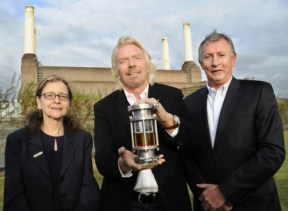Not one to shy away from difficult problems, Virgin has just announced that their aviation arm will be partnering with carbon-handling company LanzaTech to spread a new process for cleaner creation of jet fuel. Airplanes are certainly an efficient means of transporting people (more efficient than single-person vehicles, at any rate), but the sheer volume of fuel burned means that any slight improvement could bring about huge savings in costs and emissions.
The new process being promoted by Virgin isn’t actually any cleaner to burn, but the way it’s created is far more eco-friendly.
Essentially what they’re doing is repurposing waste material from other manufacturing plants, steel mills in this case. These mills produce waste gases and other junk that would normally be emitted into the atmosphere. Virgin and LanzaTech will collect these gases at the source and bring it to their facilities, where it is processed and turned into hydrocarbon jet fuel and miscellaneous alcohols (and some waste, no doubt):
They’ll be bringing the necessary retrofitting to steel mills in the UK, New Zealand (where LanzaTech is based), India, and China, and hope to have a “demo flight” in a year or so. They claim the new process reduces lifetime emissions (that is, from production to emission) by 50%.
I wonder whether this really can produce anything like the volume necessary to run a commercial fleet. Not that supplementing dirty-sourced fuel with clean-sourced fuel is a bad thing, but will it be more than a drop in the bucket? Steel, at least, isn’t going anywhere any time soon, so even if it’s a trickle, it’ll add up over time while larger-scale solutions are being pondered.
